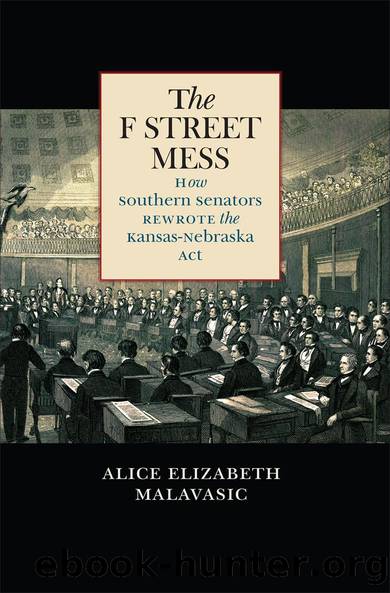The F Street Mess by Alice Elizabeth Malavasic

Author:Alice Elizabeth Malavasic [Malavasic, Alice Elizabeth]
Language: eng
Format: epub
Tags: History, United States, Civil War Period (1850-1877), Political Science, American Government, Legislative Branch
ISBN: 9781469635538
Google: 2Es3DwAAQBAJ
Publisher: UNC Press Books
Published: 2017-09-26T03:20:48+00:00
Chapter Six: Kansas
The Senateâs repeal of the thirty-four-year restriction against slavery above the 36° 30â² parallel was the pinnacle of the F Street Messâs legislative power and a major victory for Calhounâs constitutional argument that the Fifth Amendment protected slavery in the territories. Seventy-nine days after the Senate vote, the bill to organize the territories of Nebraska and Kansas passed the House 113 to 100. Eight days later, on May 30, Franklin Pierce signed into law what would later be known as the Kansas-Nebraska Act. The consequences of the act unfolded quickly thereafter in a series of sensational eventsâBleeding Kansas, the Caning of Charles Sumner, Pottawatomie Creek, Dred Scottâuntil the country stood at the precipice of war. As the decade tumbled toward its climatic end, the F Street Mess attempted to manage events in Kansas and the Senate in an effort to maintain southern power and protect the institution of slavery. But those efforts were increasingly under siege from a growing northern opposition to the Slave Power and its âpeculiarâ institution.
The F Street Mess had been motivated by a variety of factors during the legislative phase of the Kansas-Nebraska Act that did not necessarily correspond to the ideological cause of slavery. For instance Robert M. T. Hunterâs investments in the Superior Properties syndicate, put together by the billâs author of record, Stephen Douglas, had nothing to do with his proslavery ideology. Hunter stood to gain financially whether the bill passed with slavery restricted or not. Unfortunately for the Mess, the successful repeal of the 36° 30â² restriction against slavery did not translate into corresponding political or financial success. As their personal motives became less and less relevant, the Mess turned its attention solely to the ideological issue of slaveryâs western expansion. Atchison, Hunter, Mason, and Butler led the fight on the ground in Kansas and in the Senate chamber to secure slaveryâs expansion. Cause and motive became one in the postenactment period but without the same success as when divided during the legislative battle, and the power of the F Street Mess, which initially held after the actâs passage, began a precipitous decline soon after.
The Nebraska-Kansas billâs lopsided victory in the Senate was quickly forgotten during the more contested and nearly fratricidal fight in the House.1 Even though the F Street Mess had forced President Pierce to make the bill an administration measure, the president had assumed its passage in the House of Representatives would not require his active intervention. He was wrong. On March 21 House opponents of the Nebraska-Kansas bill garnered enough support to bypass the Committee on Territories and send it directly to the Committee of the Whole effectively killing the bill by burying it beneath a mountain of pending legislation.
The Pierce administration made support of the bill a test of administration and party loyalty. The president wrote editorials in favor of the bill and, along with Douglas, lobbied former and current members of Congress, using administration and party patronage, privately and not so privately, to win the House vote.
Download
This site does not store any files on its server. We only index and link to content provided by other sites. Please contact the content providers to delete copyright contents if any and email us, we'll remove relevant links or contents immediately.
| Africa | Americas |
| Arctic & Antarctica | Asia |
| Australia & Oceania | Europe |
| Middle East | Russia |
| United States | World |
| Ancient Civilizations | Military |
| Historical Study & Educational Resources |
Machine Learning at Scale with H2O by Gregory Keys | David Whiting(4292)
Never by Ken Follett(3937)
Fairy Tale by Stephen King(3369)
Oathbringer (The Stormlight Archive, Book 3) by Brandon Sanderson(3149)
The Man Who Died Twice by Richard Osman(3070)
Will by Will Smith(2906)
Rationality by Steven Pinker(2351)
Can't Hurt Me: Master Your Mind and Defy the Odds - Clean Edition by David Goggins(2320)
The Dark Hours by Michael Connelly(2300)
Friends, Lovers, and the Big Terrible Thing by Matthew Perry(2219)
The Dawn of Everything: A New History of Humanity by David Graeber & David Wengrow(2187)
Principles for Dealing With the Changing World Order: Why Nations Succeed and Fail by Ray Dalio(2035)
A Short History of War by Jeremy Black(1842)
HBR's 10 Must Reads 2022 by Harvard Business Review(1838)
Go Tell the Bees That I Am Gone by Diana Gabaldon(1748)
A Game of Thrones (The Illustrated Edition) by George R. R. Martin(1711)
Kingdom of Ash by Maas Sarah J(1667)
515945210 by Unknown(1660)
443319537 by Unknown(1543)
